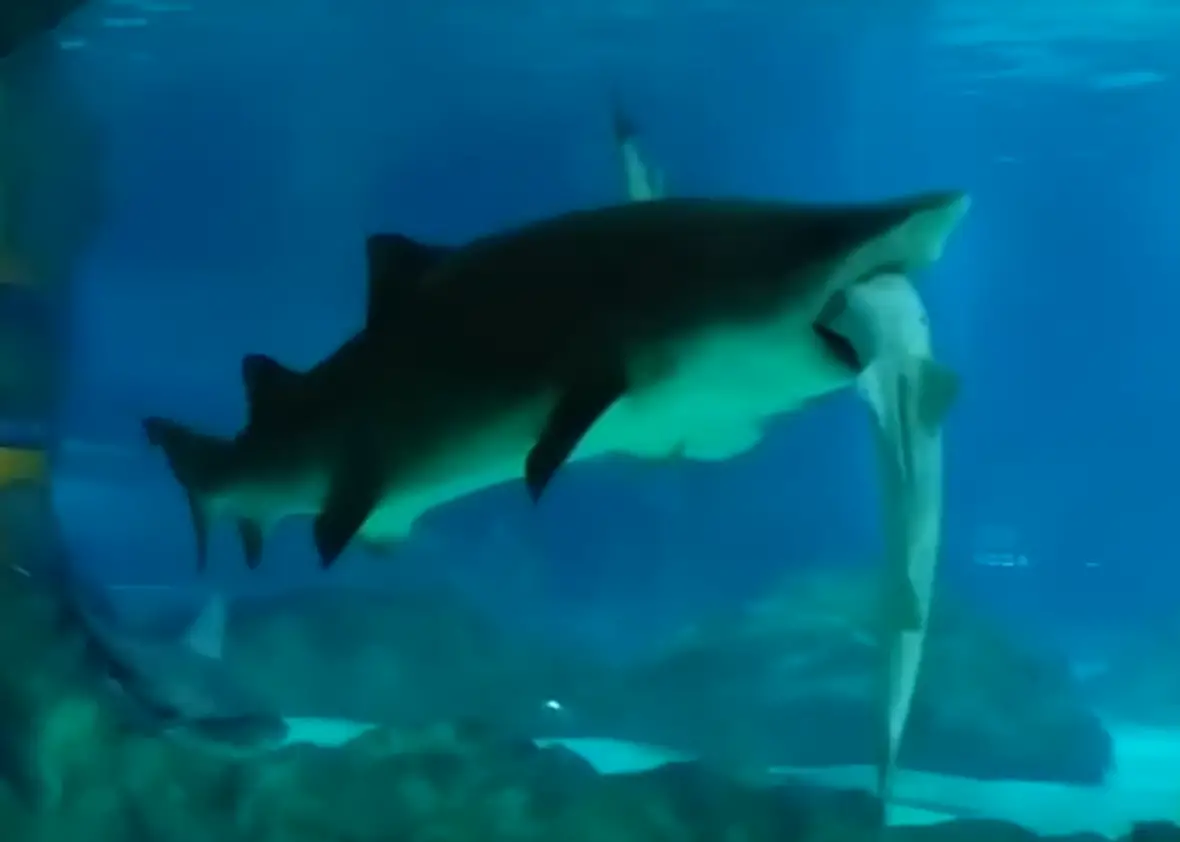Aquarium sharks are fascinating creatures to keep in your fish tank, but they can also be quite unpredictable. One of the most common problems that aquarium owners face is when their shark starts to eat other fish in the tank. This can be a frustrating and upsetting experience, but there are steps you can take to prevent this from happening again in the future.
Firstly, it’s important to understand why your shark is behaving this way. Some species of aquarium sharks are naturally predatory and will eat smaller fish. If this is the case, you may need to reconsider the types of fish you keep in your tank. Alternatively, your shark may be feeling stressed or hungry, so it’s important to ensure that they are getting enough food and that their environment is suitable for them. By taking a few simple steps, you can ensure that your aquarium shark is happy and healthy, and that your other fish are safe from harm.
If your aquarium shark is eating other fish, there are a few things you can do. First, make sure your shark is well-fed with a diet of live or frozen food. Second, create hiding spots and barriers in the tank to give the other fish a chance to escape. If the problem persists, consider separating the shark into its own tank or rehoming it to a more suitable environment.

H2: What to Do if Your Aquarium Shark Eats Other Fish?
If you have an aquarium shark, you may have noticed that it has been eating other fish in the tank. This can be a concern for many aquarium owners, but there are steps you can take to prevent this from happening again in the future. In this article, we will discuss what to do if your aquarium shark eats other fish.
H3: Identify the Reason Behind the Behavior
The first step you should take is to identify the reason behind the shark’s behavior. There can be several reasons why a shark would eat other fish in the tank, including hunger, territorial behavior, or stress. If the shark is hungry, you may need to increase the feeding frequency or the amount of food you give it. If the shark is displaying territorial behavior, you may need to rearrange the decor in the tank to create more space for the shark to swim around. If the shark is stressed, you may need to provide more hiding places and plants in the tank to make it feel more secure.
One way to prevent the shark from eating other fish is to provide it with live food, such as feeder fish or shrimp. This will give the shark a natural hunting experience and may help it to reduce its aggressive behavior.
H3: Separate the Shark from Other Fish
If the shark continues to eat other fish in the tank, you may need to separate it from the other fish. You can do this by setting up a separate tank for the shark or by using a divider to separate the shark from the other fish in the same tank. This will prevent the shark from attacking the other fish and give them a chance to recover.
H3: Introduce New Fish Carefully
If you decide to introduce new fish to the tank, you should do so carefully. Make sure that the new fish are compatible with the shark and that they are not too small or weak. You should also introduce the new fish slowly, one at a time, and monitor the shark’s behavior closely. If the shark shows signs of aggression towards the new fish, you may need to remove it from the tank.
H3: Provide Adequate Space for the Shark
One of the main reasons why aquarium sharks become aggressive towards other fish is because they do not have enough space in the tank. Sharks are territorial animals and need plenty of space to swim around and establish their own territory. If your tank is too small for the shark, it may become stressed and aggressive towards other fish. Make sure that your tank is large enough to accommodate the shark and that it has plenty of space to swim around.
H3: Maintain Good Water Quality
Maintaining good water quality is essential for the health of your aquarium shark and the other fish in the tank. Poor water quality can lead to stress and disease, which can cause the shark to become more aggressive towards other fish. Make sure that you test the water regularly and perform water changes as needed to maintain good water quality.
H3: Feed the Shark a Balanced Diet
Feeding your shark a balanced diet is also important for its health and well-being. Sharks are carnivorous animals and need a diet that is high in protein. You can feed your shark a variety of foods, including fish, shrimp, and other seafood. Make sure that you provide the shark with a balanced diet that meets its nutritional needs.
H3: Benefits of Keeping an Aquarium Shark
Despite the challenges of keeping an aquarium shark, there are many benefits to owning these fascinating creatures. Sharks are beautiful and captivating animals that can provide hours of entertainment and enjoyment. They are also intelligent and have unique personalities that can be fun to observe and interact with.
H3: Aquarium Shark vs. Other Fish
Aquarium sharks are different from other fish in several ways. They are larger and more aggressive, and require more space and a special diet. However, they are also more interesting and engaging to watch than many other types of fish. If you are up for the challenge of keeping an aquarium shark, it can be a rewarding and fascinating experience.
H3: Conclusion
In conclusion, if your aquarium shark is eating other fish, there are steps you can take to prevent this from happening again in the future. You should identify the reason behind the shark’s behavior, separate it from the other fish if necessary, introduce new fish carefully, provide adequate space, maintain good water quality, and feed it a balanced diet. With the proper care and attention, your aquarium shark can be a beautiful and fascinating addition to your tank.
Frequently Asked Questions
Do you have an aquarium shark that is eating other fish? Here are some commonly asked questions and answers to help you address the problem.
What should I do if my aquarium shark is eating other fish?
If you have an aquarium shark that is eating other fish, the first thing you should do is remove any injured or dead fish from the tank. Next, you should assess the reasons why your shark is eating other fish. Is it hungry? Is the tank too small? Is the shark stressed? Once you figure out the reason, you can take appropriate action. For example, if your shark is hungry, you may need to increase its feeding frequency or portion sizes. If the tank is too small, you may need to upgrade to a larger tank. If the shark is stressed, you may need to add more hiding spots or reduce any potential stressors in the tank.
Additionally, if the problem persists, consider consulting with a veterinarian who specializes in aquatic animals.
How can I prevent my aquarium shark from eating other fish?
Preventing your aquarium shark from eating other fish requires proper tank maintenance and attention to the shark’s behavior. First, make sure your tank is large enough to accommodate your shark and its potential prey. Provide plenty of hiding spots and avoid overcrowding the tank. Additionally, monitor your shark’s behavior and feeding habits. If you notice any signs of aggression or overeating, address the issue immediately.
You can also consider adding non-fish companions to the tank, such as snails or shrimp, to provide alternative food sources for your shark. Finally, research the specific species of shark you have and its dietary needs to ensure you are providing adequate nutrition.
Can I train my aquarium shark not to eat other fish?
Training your aquarium shark not to eat other fish is possible, but it requires patience and consistency. Start by feeding your shark at regular intervals and in a consistent location. Gradually introduce small amounts of live food or frozen food to the tank and monitor your shark’s behavior. If the shark shows interest in the food but does not immediately attack, gradually increase the amount of food provided.
You can also use a feeding stick or target training to redirect your shark’s attention away from other fish. Finally, provide plenty of hiding spots and alternative food sources to help reduce the shark’s predatory instincts.
What are some common reasons aquarium sharks eat other fish?
There are several reasons why aquarium sharks may eat other fish. One of the most common reasons is hunger. If your shark is not receiving enough food or is not being fed frequently enough, it may resort to eating other fish. Another reason may be stress. If your shark is not provided with enough hiding spots or is exposed to high levels of stress, it may become more aggressive towards other fish. Finally, overcrowding or a lack of adequate space in the tank may also contribute to shark aggression and predatory behavior.
Other factors, such as water quality, tank maintenance, and the specific species of shark you have, may also play a role in your shark’s behavior. If you are unsure why your shark is eating other fish, consult with a veterinarian or aquatic specialist for further guidance.
Is it normal for aquarium sharks to eat other fish?
For some species of aquarium sharks, such as the red-tailed shark or the rainbow shark, it is normal for them to eat small fish or invertebrates. However, for other species, such as the bala shark or the silver shark, predatory behavior towards other fish may be a sign of stress or a lack of proper nutrition.
Ultimately, it is important to research the specific species of shark you have and its natural behaviors to determine if predatory behavior towards other fish is normal or a cause for concern. If you are unsure, consult with a veterinarian or aquatic specialist for further guidance.

Why Don’t Aquarium Sharks Eat the Other Fish?
In conclusion, having an aquarium shark that eats other fish can be a challenging situation for any fishkeeper. However, there are steps you can take to prevent this from happening in the first place. First, research the specific species of shark you are considering and only house them with compatible tankmates. Second, provide ample hiding places and territories within the tank to reduce aggression and competition for resources.
If your shark does end up eating other fish, it is important to address the issue as soon as possible. Remove any remaining fish from the tank and assess the shark’s behavior to determine if it is simply hunting for food or displaying aggressive tendencies. If it is the latter, consult with a professional aquarist or veterinarian to develop a plan of action.
Remember, keeping an aquarium is a responsibility and requires ongoing education and attention. By taking proactive measures to prevent fish predation and addressing any issues promptly, you can ensure the health and wellbeing of all the inhabitants in your aquatic ecosystem.
